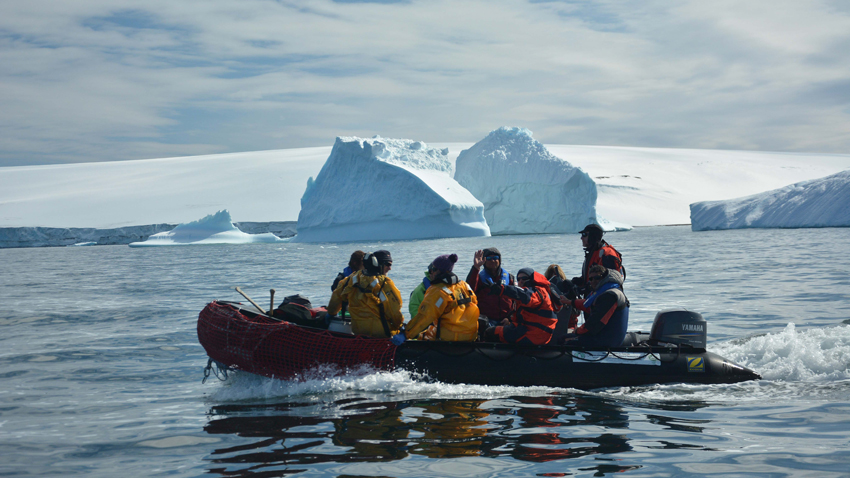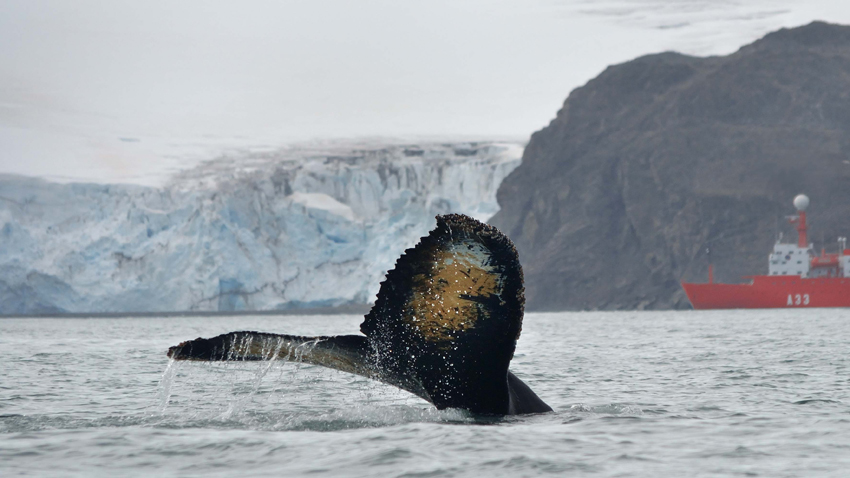Why don’t polar bears eat penguins? Anybody able to answer this question earns the chance of being selected for the next expedition to Antarctica. In fact, the answer is that polar bears live in the Arctic, and penguins - in Antarctica. There are many asked and unanswered questions about the icy continent, and Iglika Trifonova is determined to dig for the answers. She is the chairperson of the Young Polar Researchers organization at the Bulgarian Antarctic Institute. „In 1999, no one believed me that my dream of traveling to Antarctica would materialize, not to speak of taking part in four expeditions. In a certain way Antarctica has become my mission and fate”, Iglika Trifonova says. She presents vanguard projects taking researchers thousands of kilometres away from Bulgaria.

“I visit schools, science and ecology forums. I and my colleagues are everywhere to speak about that continent and about care for the environment. This year we have a major attraction – the collected sounds from Antarctica – recorded quite professionally by our colleague Tatiana Asenova. The sound collection will be provided to persons with impaired eyesight in Bulgaria, but also for the sake of a psychological experiment to test how these sounds impact on humans. It is also curious to find out how children accept the audio recordings from Antarctica. We have footage showing how Bulgarian explorers in Antarctica live. It is “the continent of peace and science”. People there live well because they help each other. This is a sample of an orderly human community because money has no importance at all while human relationships are the focus. Our neighbours by base, the Spaniards, have always been great friends. The atmosphere is quite nice and the Bulgarian base is very different from other bases in Antarctica. Every foreigner who visits us is thankful for the warmth and joy of our reception. We are all enthusiasts. Antarctica displays the very best in a human being. Life there provides evidence that in the suitable environment people can change for the better and become very supportive of each other. In those harsh conditions, there is no place for envy or confrontation – we live like a large, united family.”

The 25th Bulgarian Antarctic expedition was held earlier this year and the young Antarctic researchers are bracing for the next one. Their team has grown accepting also writers, artists and people of art. “Apart from science we give plenty of time to many educational projects in schools. We tell kids about Antarctica and they give us their drawings with their idea about it”, Iglika Trifonova says. In the near future she plans to take to the icy continent whole classes including the teachers. “There is such a good practice in other countries, and we want to borrow their experience – to deliver this sensation to Bulgarian kids. This is a way to encourage the young to take up science and create an interest in our latest research”, she explains and adds:

“My role as a photographer and a former journalist is to show to children and the wider public what is happening in Antarctica; I carry out a documentary work of sorts and I assist research projects. I have been there four times. The first two times I helped biology research – catching penguins and seals to do DNA analysis. This year I supported the project of psychologists on how human behaviour and perceptions change when someone faces the harsh conditions of Antarctica. There is a big change – but we tend not to pay attention: we’d rather pay attention to the animals and nature. There, in the icy desert, all inhibitions and restrictions created by civilization simply vanish. The people’s families are away, and they live in an environment that promotes honesty and goodness. Bulgaria is 14,000 km away and there is no way to flee and reunite with the comfort of your home. This teaches you how to be a team player, to show a sense of humour – and good humour too. There is no television and internet there meaning we pay more attention to each other. It is important to be friendly and able to survive.”
English Daniela Konstantinova
This year, Christmas has "arrived" in Sofia as early as November with the aroma of mulled wine, cinnamon and festive magic. Radio Bulgaria recommends that you visit some Christmas spots in the Bulgarian capital city: For those most impatient to..
Three-time world champion and Olympic weightlifter Carlos Nasar will be holding a special event with the Bulgarian community in London on 23 November. According to the organisers, it will be an open conversation in which Nasar will discuss his journey..
On 16 November, we celebrate Caritas Day, when we honour the Catholic Church’s charity organisation that brings hope to those in need through care and acts of mercy . It reminds us that financial gain is not what matters most. What truly matters is..
From fear and doubts to joy and support – Bulgarians react differently to the upcoming introduction of the euro on January 1, 2026. For..
Teodora Byalkova joined the Bulgarian Sunday school "Sts. Cyril and Methodius" in Athens in the 2022/23 school year. At that time, she..
On the eve of Christian Family Day, 21 November, dozens of couples from Dimitrovgrad renewed their wedding vows after spending more than half a century..

+359 2 9336 661
